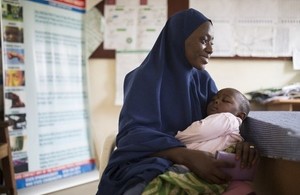UK aid supports global efforts to tackle preventable maternal and newborn deaths
The UK is pledging extra support to help bridge the healthcare gap in developing countries, to help stop women and babies dying in childbirth.

A woman talking to a health practitioner at a clinic in Minna, Nigeria, June 2018. Picture: Dominic Chavez/GFF
The UK is pledging extra support to help bridge the healthcare gap in developing countries, to help stop women and babies dying in childbirth, International Development Secretary Penny Mordaunt will announce today (Tuesday 6 November 2018).
Every year more than five million mothers and children die from preventable causes related to pregnancy such as blood loss and infection, or low birth weight due to malnutrition.
These deaths can be avoided with access to the right medicine, equipment and resources, but maternal, newborn and child health services are either under-resourced or not easily accessible in many low and lower-middle income countries.
At the Global Financing Facility Replenishment Event in Oslo today – hosted by Melinda Gates, the President of Burkina Faso and the Prime Minister of Norway – the UK committed £50 million to the World Bank’s Global Financing Facility (GFF) to help close the global funding gap for these services so the health of mothers and babies is not neglected.
International Development Secretary Penny Mordaunt said:
Every day, more than 800 mothers die from preventable causes related to pregnancy and childbirth and 99% of these are in developing countries. This must change.
Empowering women and girls and investing in health services not only saves lives but also helps the most marginalised people to realise their full potential. UK aid is supporting the Global Financing Facility to make a bigger impact in this area, bringing together governments and the private sector to fill the gaps in healthcare around the world.
Through the GFF, UK aid will support increased investment to make medicines, equipment and life-saving resources more available for pregnant women, babies and children in 27 countries across Africa and Asia until 2023.
The GFF is unique in that contributions from UK aid, alongside other donor countries, will be used to galvanise investment from the private sector and recipient governments too.
The GFF will also work with governments prioritise nutrition, to avoid stunted growth and malnutrition in children, and improve access to contraception, empowering young girls and women in countries where it is not easily accessible to be able to choose whether or when they have children.
This will help young girls to have better control of their health and futures, to choose to stay in education if they wish, and improve their own and their country’s ability to thrive in the global economy.
The GFF will focus on improving access for those in remote areas. For example, in some countries where patients living in rural areas depend on private providers for their healthcare, the GFF is working with private providers to improve the quality of care they give and reduce costs to patients.
This latest support builds on the UK’s £30 million investment in the GFF made at the Family Planning Summit in London last year.
General media queries (24 hours)
Email mediateam@dfid.gov.uk
Telephone 020 7023 0600
If you have an urgent media query, please email the DFID Media Team on mediateam@dfid.gov.uk in the first instance and we will respond as soon as possible.